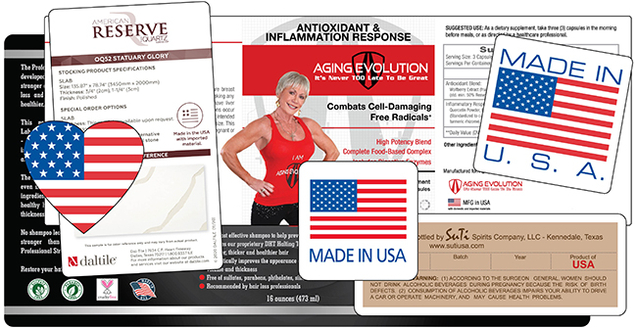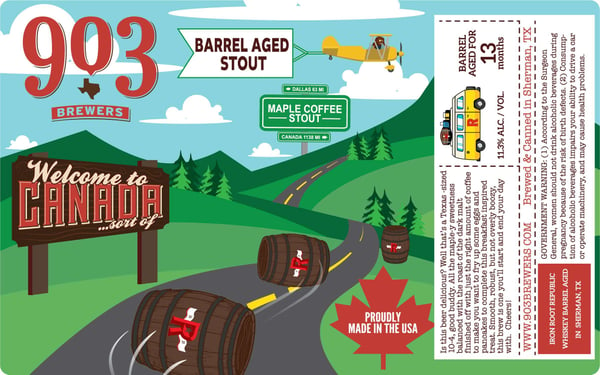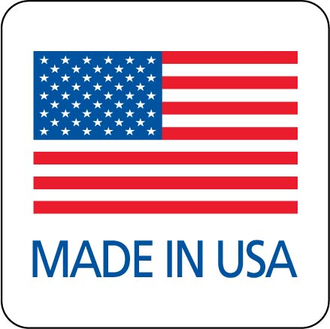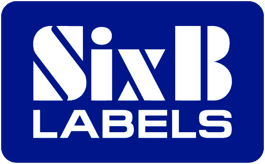 |
| Made in USA: Various Styles |
If a product undergoes its last substantial transformation in the United States, the company labeling the product, according to U.S. law, does not need to include the country of origin on the label. In fact, there is no general requirement for an American-manufactured product sold in the United States to be labeled as such. The only exceptions are automobile, textile or wool products.
However, if a manufacturer or marketer decides to claim a country of origin while promoting/labeling a product, the claim must be truthful, and the company needs a reasonable basis on which they can support the claim, backed by competent, reliable evidence.
The Difference Between an Express and an Implied Claim
If a company labels a product "Made in the U.S.A." or makes a statement to that effect in an advertisement, that would serve as an express claim. On the other hand, a label can easily make an implied claim to a U.S. origin based on its imagery. A picture of an American eagle or another U.S. symbol, a U.S. flag or map, an American geographic reference, or an over-emphasis on a U.S. address or manufacturer's headquarters, could also be taken as an implied claim that the product is being made in America.
 |
| Sports a Maple Leaf But Still Made in USA |
But a legal trademark that consists of, or includes, a stylized mark suggesting an American flag would not be considered a U.S. origin claim. And the FTC would not consider a brand name or trademark on a label, by itself, as a country of origin claim, even if a consumer is mistaken in believing that a product made by a manufacturer based in the U.S. is made in America.
How Does the FTC Judge Whether a Product Qualifies for a "Made in U.S.A" Label?
What Products Do These Requirements Apply To?
As of 2021, for an unqualified "Made in the U.S.A" or similar claim, per the FTC's policy statement, "all or virtually all" of a product must be made in the U.S., and the manufacturer of any product so labeled must be able to substantiate that claim. This applies to all products advertised or sold in the United States. However, if the product is for export, the manufacturer must also consult the laws or rules of the country to which the product is being sold for labeling compliance.
What Does "All or Virtually All" Mean?
A product must be one in which all of the important parts and processing that go into it originated in the U.S., and the product must contain only negligible foreign content, for it to be considered "all or virtually all" made in America.
The FTC looks at a number of factors when determining if a company has met this requirement. They want to see that final assembly or processing took place in the United States; that the majority of the product's total manufacturing costs come from U.S. parts and processing; and determine how far the foreign content is from the finished product.
When determining if a product label may bear the claim "Made in America," the cost of goods sold or the inventory costs of finished goods have to be factored in when analyzing whether 'all or virtually all' of the product was American-made. These costs are limited to the total cost of manufacturing materials, direct labor and overhead. Good-faith representations given by American suppliers can be relied upon, but product manufacturers need to ask their suppliers for specific information about U.S. content and look far enough back in the process to have a reasonable conviction that the product has no significant foreign content.
What Sort of Products May Include Foreign Materials or Parts and Still be Labeled "Made in U.S.A."?
If a U.S.-made appliance has imported knobs, for example, the knobs are only a minor part of the product's total manufacturing costs or the final product, so the appliance can fairly be labeled "Made in U.S.A." or it's equivalent. If the housing of a clock radio is made of plastic produced from imported petroleum, and the other components are made in America, the makers of such an item could normally stake a valid "Made in U.S.A." claim for the product and display that on their labels.
 |
| Custom Yet Traditional: Made in the USA |
But a wrench made from imported steel cannot bear the "Made in U.S.A." label because foreign steel is a significant part of the final product, and not far enough removed from it. And if a product otherwise made in the U.S.A. contains a component vital to its function that is of foreign origin, and this could deceive consumers into thinking that the product is strictly American-made, the FTC might require the company to label the product, 'Made in the U.S.A. from the U.S. and Imported Parts.'
What Terms Might be Considered Deceptive When Labeling a Product 'Made in the U.S.A. of Foreign Parts'?
As of 2021, any product that is not "all or virtually all" made in the U.S.A. must have its U.S. origin claims adequately identified. As long as the claim is truthful and substantiated, a manufacturer or marketer may make any qualified claim regarding the U.S. content of its products.
But in order to avoid being considered deceptive, such general terms as "produced" or "manufactured" in the United States need to be further qualified. Hence there is a place for a label that references foreign parts used in a product otherwise manufactured in the United States. The FTC has determined that a label marked "Assembled in the United States" is also acceptable without further qualification.
However, since assembly includes many processes, consumers may find that term confusing or misleading. Therefore, that label should be used only when the product has undergone its last, substantial transformation via assembly in the U.S.
What Do You Need to Know About SixB Labels as a Resource for Your Labeling Needs?
Our goal is always to be, and to remain, your quality label provider. Please feel free to come to us with your label questions and your printing needs. SixB Labels is here for you and you can rely upon our four decades of experience and expertise as custom providers of Labels, Decals, Bar Codes, Labeling Products and so much more. If you have a project that includes a "Made in U.S.A." product label, or another pressure-sensitive custom label, we invite you to contact us today!
Save Time - Email Us Directly With Your FTC Labeling Questions:

